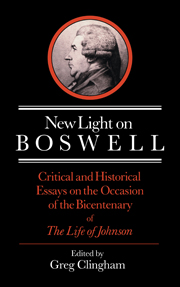 New Light on Boswell
New Light on Boswell Book contents
- Frontmatter
- Contents
- Notes on contributors
- Preface
- Acknowledgements
- Abbreviations
- 1 Introduction: Boswell's ambiguities
- Part I BOSWELL AND EIGHTEENTH-CENTURY SCOTTISH CULTURE
- Part II CONTEXTS FOR THE LIFE OF JOHNSON
- 6 Boswell's liberty-loving Account of Corsica and the art of travel literature
- 7 Boswell and sympathy: the trial and execution of John Reid
- 8 Boswell and Hume: the deathbed interview
- 9 “This Philosophical Melancholy”: style and self in Boswell and Hume
- Part III THE LIFE OF JOHNSON RECONSIDERED
- Index
9 - “This Philosophical Melancholy”: style and self in Boswell and Hume
Published online by Cambridge University Press: 28 October 2009
- Frontmatter
- Contents
- Notes on contributors
- Preface
- Acknowledgements
- Abbreviations
- 1 Introduction: Boswell's ambiguities
- Part I BOSWELL AND EIGHTEENTH-CENTURY SCOTTISH CULTURE
- Part II CONTEXTS FOR THE LIFE OF JOHNSON
- 6 Boswell's liberty-loving Account of Corsica and the art of travel literature
- 7 Boswell and sympathy: the trial and execution of John Reid
- 8 Boswell and Hume: the deathbed interview
- 9 “This Philosophical Melancholy”: style and self in Boswell and Hume
- Part III THE LIFE OF JOHNSON RECONSIDERED
- Index
Summary
A man should not live more than he can record…a Diary…will not only be most immediately useful to the person who keeps it, but will afford the most authentick materials for writing his life.
This was one of the blackest days I ever passed. I was most miserably melancholy… I was very dreary. I had lost all relish of London. I thought I saw the nothingness of all sublunary enjoyments. I was cold and spiritless.
Boswell's journals record his melancholy moods as regularly as all his other sensations. This hypochondria or “Hyp” was at once another pose for the chameleon diarist (he wrote an entire series of periodical papers under the pseudonym “The Hypochondriack”), and the most intractable, unwriteable part of himself. Any eighteenth-century writer expressing melancholy was doubly conscious of its public and private dimensions: in Boswell's journals its presence focuses the problems of integrating life and writing with the degree of intimacy that his record tries to achieve.
Melancholy or hypochondria was a recognized medical condition also known as “spleen,” which was supposed peculiarly characteristic of English persons of quality, idleness being the condition under which it flourished. It was accompanied by languor, disgust for worldly activities which charmed at other times, and the feeling of pointlessness identified by Boswell in his London Journal. Luxury it was to some extent, and even its victims recognized a fashionable dimension to their affliction. But it was also painfully real and intensely private: the silent resistance of the inner self to all the demands of social living.
- Type
- Chapter
- Information
- New Light on BoswellCritical and Historical Essays on the Occasion of the Bicententary of the 'Life' of Johnson, pp. 126 - 140Publisher: Cambridge University PressPrint publication year: 1991
- 1
- Cited by


